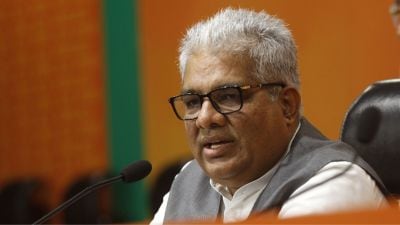ADDRESSING a rally in Aligarh earlier this week, Prime Minister Narendra Modi mentioned its famed locks as among those put on priority by the Uttar Pradesh government as part of its ‘One District, One Product (ODOP)’ initiative. “The BJP government is strengthening every industry. The small-scale industries here have also got a lot of help from Mudra Yojana,” Modi said.
In the narrow lanes of Aligarh where the lock industry and its ancillary units operate – “Yahan har ghar mein taala banta hai (Here every house makes locks)”, the saying goes – such promises are yet to trickle down.

Anis Ahmad, one of the biggest lock manufacturers here, with a unit in Shah Jamal in Old Aligarh, overrun by overflowing drains, garbage heaps and hanging overhead electric wires, says MSMEs like theirs are lagging behind. “Government policies favour only big businesses.”

However, sitting in his office at his two-floor factory, as the sound of clanging machines trickles in, the 40-year-old adds that they don’t know much else to do. “Yeh hamare khoon mein hai (Lock-making is in our blood). Every generation passes on the knowledge to the next. However, most of those employed in it are not educated, and are unorganised and very poor; they know the technique of making locks, but they do not know how to market it or to get the benefits of government policies.”
 Birendra Kumar, Joint Commissioner of Industries, Aligarh, says the district has around 5,000 units registered under the ‘Locks and Ancillary’ category.
Birendra Kumar, Joint Commissioner of Industries, Aligarh, says the district has around 5,000 units registered under the ‘Locks and Ancillary’ category.
Ahmad says they are also worried about the administration’s plan to move the lock units to industrial areas like Tala Nagri, citing “violation” of norms. “How will a small unit buy land there?… Why uproots thousands of people? Yahan ek dusre ki chain fansi hui hai (People are dependent on each other here),” he says, while showing how “70 types of items” go into making a single padlock.
 Loans disbursed by Banks under ODOP (cost and subsidy figures in Lakhs)
Loans disbursed by Banks under ODOP (cost and subsidy figures in Lakhs)
Mohammad Azharuddin, who now runs his father’s electroplating business, which is an important component of lock manufacturing, says that while PM Modi to Opposition leaders mention Aligarh locks in their speech, the industry’s issues don’t figure among the concerns of any one.
“We have no union, no leader. Jab hum doctor ko apni pareshani batayenge hi nahin, toh woh ilaaj kaise karega (If we are not able to tell a doctor our problem, how can he treat us)?” Azharuddin says, adding that Gujarat towns such as Rajkot and Jamnagar are now coming up as big players in the business, “only because they work together”.
Story continues below this ad
 The yearly turnover is over Rs 10,000 crore. Around 1.5 lakh people are involved.
The yearly turnover is over Rs 10,000 crore. Around 1.5 lakh people are involved.
“I wonder if any person here has even heard that the lock industry is part of the Uttar Pradesh government’s ODOP scheme.”
Azharuddin admits that a lot of hesitation towards the authorities is on account of the grey zone in which the units operate, but pointing to their rising input costs now, and adds: “If the government thinks of this work as heritage, they should give attention to the people involved in it.”
 No. of Persons tained in ODOP skill training
No. of Persons tained in ODOP skill training
Shubhamraj Varshney, who runs a lock shop in the Madar gate area of Aligarh, says the rising costs of inputs are hard to explain. “Some say it is due to the Ukraine-Russia and Israel-Palestine wars. However I don’t think that is true. The raw materials do not come from these countries.”
Birendra Kumar, Joint Commissioner of Industries, Aligarh, says the district has around 5,000 units registered under the ‘Locks and Ancillary’ category. “The yearly turnover is over Rs 10,000 crore. Around 1.5 lakh people are involved. The ODOP scheme consists of several components: finance, where a maximum subsidy of Rs 20 lakh is given for a loan of Rs 2 crore; a 10-day special training programme for artisans, with the provision of tool kits; and marketing development assistance to manufacturers, including subsidies to set up stalls at trade fairs and exhibitions,” says Kumar.
Story continues below this ad
 Shubhamraj Varshney, who runs a lock shop in the Madar gate area of Aligarh, says the rising costs of inputs are hard to explain.
Shubhamraj Varshney, who runs a lock shop in the Madar gate area of Aligarh, says the rising costs of inputs are hard to explain.
Satish Gautam, the BJP’s two-time Aligarh MP, fielded again by the party, also talks about the ODOP scheme as the answer. Admitting that the woes of the industry were not a poll issue, Gautam refers to PM Modi’s speech to say it is very much on the BJP government’s mind. “Manufactures are already benefiting from the ODOP scheme, we will increase its coverage in the third term.”
Gautam has won the last two times by margins of over two lakh votes. Facing him this time are the SP’s Bijendra Singh and the BSP’s Hitendra Upadhyay.
In 2019, Gautam got 56.42% of the votes, with the BSP’s Ajeet Baliyan a distant second with 36.71%. The Congress got merely 4.37% votes.




 Birendra Kumar, Joint Commissioner of Industries, Aligarh, says the district has around 5,000 units registered under the ‘Locks and Ancillary’ category.
Birendra Kumar, Joint Commissioner of Industries, Aligarh, says the district has around 5,000 units registered under the ‘Locks and Ancillary’ category. Loans disbursed by Banks under ODOP (cost and subsidy figures in Lakhs)
Loans disbursed by Banks under ODOP (cost and subsidy figures in Lakhs) The yearly turnover is over Rs 10,000 crore. Around 1.5 lakh people are involved.
The yearly turnover is over Rs 10,000 crore. Around 1.5 lakh people are involved. No. of Persons tained in ODOP skill training
No. of Persons tained in ODOP skill training Shubhamraj Varshney, who runs a lock shop in the Madar gate area of Aligarh, says the rising costs of inputs are hard to explain.
Shubhamraj Varshney, who runs a lock shop in the Madar gate area of Aligarh, says the rising costs of inputs are hard to explain.





























